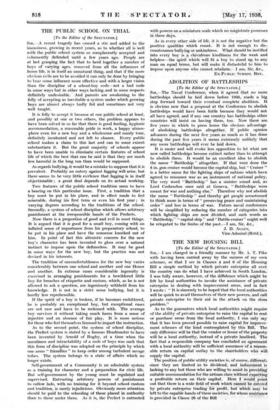ABOLITION OF BATTLESHIPS [To the Editor of the SPECTATOR.] -
- SIR,—The Naval Conference; when it agreed that no more battleships should be kid' doWn before 1936, made a big Step forward toward their eventual complete abolition. It is obvious now that a proposal at the Conference to abolish battleships would have been futile because they would not all haVe agreed, and if any one country hai battleShips other countries will insist On hiving them, too. Now there are five years 'in WhiCh to press home. the Obvious adVantage of abolishing battleships altogether.' If public opinion adVances during the next five years as much as it has done during the past five years it seems 'extremely unlikely that any more battleships will ever be laid doivn.
It is easier and will evoke- less opPosition to let what are now called battleships become extinct rather than to attempt to abolish them. It would be an excellent idea to abolish the name " Battleship "altogether. If that were done the 8 in. gun cruiser would become the capital ship, but " Cruiser " is a better name for the fighting ships of nations which have agreed to renounce war as an instrument . of national policy.. The very Word "Battleship " his a sinister sound and, as Lord Cushendun once said at Geneva, " Battleships were meant for war and nothing else." Therefore why not abolish the name " Battleship " and thereby get people accustomed to think more in terms of " preserving peace and maintainini. order " and less in terms of War. Future naval conferences Will be siniplified by reducing the number of categories into which fighting ships are now divided, and such words as "Battleship," " capital ship " and " Battle-cruiser" might well be relegated to the limbo of the past.—I am, Sir, &c., " J. D. AilEx,
Vice-Admiral (Retd.).














































 Previous page
Previous page